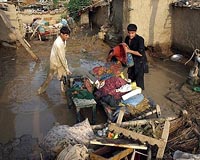| . |  |
. |
Djeddah-Thiaroye Kaw, Senegal (AFP) Aug 27, 2009 Every year, in the rainy season, the floors of Omar Barro's house in the suburbs of Senegal's capital Dakar are submerged, like others all around. "We are like fish," he says. The flooding, which on Thursday led the government to enact an emergency plan, forces this 17-year-old tailor's assistant and thousands like him to "eat, pray and do everything in the water." Sandbags mark out the pathways through Djeddah-Thiaroye Kaw, a teeming suburb which has turned into a marshland whose inhabitants roll up their trousers and robes to get around. The flooding is so frequent that fresh-water plants and green algae soon put in their annual appearance, but the extent of the damage this year is such that the Dakar suburbs have made front-page news in the local papers. "For about eight years, this water has been stagnating here, forcing many families to leave. About 40 more left for a neighbouring area after the last rains," said Momar Diaw, the head of the Medina 5 district, standing in swampland. "In this Ramadan period, we have no place to pray," he added, pointing out the flooded mosque. "Each year, in August, the flooding is back. Sixty-two districts (out of 66) in Djeddah-Thiaroye Kaw have been under water for years," explains Ibrahima Diouck, the deputy mayor of the town in the suburbs of sprawling Dakar. The local population has settled in "flood zones, natural lakes that they have dammed, but the water table rises each winter," says Pape Goumbo Lo, a geologist and environmental specialist at the Dakar Institute of Earth Sciences. "This began with the drought of the 1970s (and) it is linked with the natural demographic growth of Dakar," whose population has grown from 500,000 in 1967 to more than two million today, mainly because of a rural exodus. A former local health employee, Yacine Sagna, blames the "lack of a sewage system" for the district, like many others around the west African country's capital. Goumbo Lo says that the only real solution is that "the people leave the uninhabitable zones where they live." But if they go, others -- poorer still -- will come and live in their place, many residents believe. On Thursday, the government set its emergency plan into action and provided three million dollars to pay for means to cope with the effects of flooding in the capital and other regions. But the opposition Socialist Party called on the authorities not to limit themselves to noble-sounding "announcements and to provide adequate means for the benefit of the victims." Another party, the Alliance for the Republic, accused President Abdoulaye Wade of "persisting in his contempt for the collective suffering". In 2005, after floods that left thousands homeless, the government launched a plan to rehouse the population of the suburbs, at a cost of 52 billion CFA francs (79 million euros/113 million dollars). But the Socialist Party has demanded "an evaluation" of this plan, claiming that "billions were swallowed up" without explanation and that its efficacity was dubious. Officially, 1,792 families living in flood zones have been lodged elsewhere, according to the deputy coordinator of the programme, Mansour Ndoye. "Other phases are in hand to rehouse between 13,000 and 15,000 families from the Pikine and Guediawaye" suburbs of Dakar, he told AFP. Share This Article With Planet Earth
Related Links Bringing Order To A World Of Disasters When the Earth Quakes A world of storm and tempest
 Pakistan floods kill 27, affect 70,000: UN, officials
Pakistan floods kill 27, affect 70,000: UN, officialsPeshawar, Pakistan (AFP) Aug 18, 2009 Flash floods have killed 27 people and affected 70,000 others in northwest Pakistan, where authorities are already grappling with a displacement crisis, government officials and the UN said. Heavy rain since Sunday has also caused massive destruction to homes, livestock and crops in Mardan and Swabi districts. "The flash floods inundated five villages in Swabi district, affecting 70,000 ... read more |
|
| The content herein, unless otherwise known to be public domain, are Copyright 1995-2009 - SpaceDaily. AFP and UPI Wire Stories are copyright Agence France-Presse and United Press International. ESA Portal Reports are copyright European Space Agency. All NASA sourced material is public domain. Additional copyrights may apply in whole or part to other bona fide parties. Advertising does not imply endorsement,agreement or approval of any opinions, statements or information provided by SpaceDaily on any Web page published or hosted by SpaceDaily. Privacy Statement |